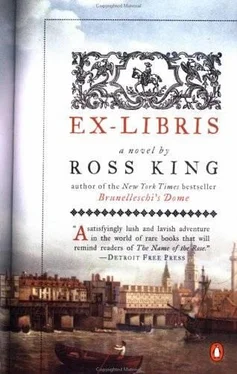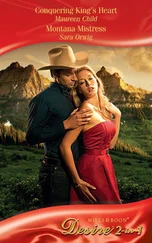There were no more sounds from the laboratory-no ringing vials and no cries for help. For a moment I wondered if I should return for Alethea, but then, gripping the banister, I continued my cautious descent. I was not prepared to die, I told myself, for the sins of Sir Ambrose Plessington. Through the open door I could see that the rain had finally stopped. The wind had steadied and the sun was threatening to appear. Such is the mockery of fate. As I crossed the atrium, my boots crunched the shattered crystal. I felt palsied and unstable until I realised that the floor was trembling underfoot. The blood had spread outwards from Phineas's prostrate body like the tendrils of a bright, submarine plant. I had just stepped past the gaudy slick when I heard a shout and then saw a lone figure in the library doorway, dressed in black. I caught a last view of the felled shelves and the chaos of the sodden masses on the floor before rushing through the doorway and into the dun-coloured light.
The horses, spooked by the commotions, tossed their heads in alarm and shied backwards as I flung myself towards them. The park, half-waterlogged, wavered before me, reflecting a lurid sky. I thought of boarding the coach and so making my escape, but there was no time. I could hear my pursuer shouting in Spanish, while another figure had appeared from round the side of the house, near the physic garden. So I began to run instead, fleeing in the opposite direction, towards the hedge-maze. Perhaps I had visions of drawing the killers away from Alethea-of fulfilling for one last time the task for which I was hired. Had it not been my rash flight from London that brought them to Pontifex Hall in the first place? It was a foolish, fantastic notion: I with my crippled foot and wheezing lungs was no match for either of my pursuers, the second of whom I saw was Sir Richard Overstreet. But as I approached the maze I risked a second glance over my shoulder and saw a deep furrow open in the ground behind me, a long trench running across the park, from the cress-pond towards the coach-and-four.
In retrospect the crevice seems a cataclysm of near-biblical dimensions, perhaps even a miracle, if miracles can be so reckless and tragic. The rear wheels of the coach were swallowed first. The ground trembling beneath them crumbled and the coach tipped backwards before heeling in the trough, which had widened to more than six feet and filled with water as the subterranean current burst to the surface. The horses' hindquarters shimmied for a second and then disappeared. The first of my pursuers, the man in black, stopped short at the brink and stumbled. He stared across at me, aghast and amazed, as the reddish earth collapsed and the chasm yawned ever wider. Then he, too, disappeared into the gaping jaws.
I whirled and kept running. The air was tart with privet and hedge-mustard, whose overgrown branches clawed at my cheeks and shoulders as I dived into the maze and swung left into an even thicker gauntlet of wet branches and sharp holly leaves. Puddles splashed underfoot. Through a small gap in the hedge I glimpsed Sir Richard, his pistol in hand as he dashed towards the entrance to the maze. Another fork. I turned right, then left, threading my way inside the sinuous passages. At one point I tripped on a root and, raising myself, discovered a pair of hedge-clippers abandoned in the undergrowth. I picked them up-the blades were rusty but still sharp-and again took to my heels.
It must have been another minute or two before I heard the scream. By this point I had reached the centre of the labyrinth, a small, scrubby patch of ground on which had been placed a wooden bench, rotted by the elements. I could hear Sir Richard crashing along the paths and realised he must be following my footprints through the mud. Yet another trail that had betrayed me. He would soon catch me-if the hedge-maze wasn't swallowed first, for the ground was trembling and shaking like a stonemason's yard. When the shriek broke the air I was gripping the handle of the clippers and backing into the pruned branches, preparing for a passage of arms. Looking up I glimpsed, above the parapets of box and hornbeam, a lone figure poised in a first-floor window.
Alethea had reached the laboratory after all. I climbed on to the bench's cracked seat and saw her throw the casement wide and gesture wildly. I glimpsed her for only a second, because no sooner had the panes flashed in the sunlight-for the sun, incredibly, had now appeared-than the south wing of the house began crumbling into the trench. Timbers warped and snapped, then came the landslide of ashlar and stone that exposed the library through a haze of plaster dust before its timbers likewise buckled, shedding scores of books into the great chasm. The first floor overhung the cavity for a few seconds before it began its own ponderous slide. A section of the roof lurched forward, shedding tiles; then the corbels shattered and the last of the roof spilled into the river surging through the foundations.
I was still perched on the bench, frozen with fear as the dreadful spectacle unfolded before me. I heard another scream as the east elevation fissured and collapsed like a rock-face, raising clouds of dust that billowed and swirled like cannon-smoke. The magnificent structure with its exposed compartments-each with its furniture and wallpaper-now looked no more than a doll's house or an architect's model. I could even see the laboratory with its telescope and the shelves of shattered vials. But there was no sign of Alethea, not there or anywhere else. I had leapt from the bench and was moving back through the maze when the floor of the atrium disintegrated and the doll's house crumpled inward, its floors collapsing together with a rumble I could feel in my diaphragm. I thought I heard yet another scream, but I must have been mistaken: it was only the sound of tortured iron and splintering beams, the last fragments of Pontifex Hall tumbling into the voracious water.
Closing time. Darkness has gathered in the windows and fallen over the broad sea-reach of the Thames. The girders of the ancient drawbridge groan as they rise to admit a final passage to the tanned sails of barges and smacks nosing downstream into the grey offing. The last of the afternoon traffic has crunched across the snow-covered carriageway. In a minute there will come a gentle ruffle as the awning is furled, followed by a clapping of shutters. Tom Monk and his three children are astir below, rattling keys and counting coins, while I sit upstairs in my study, here in my last refuge, clasping a goose quill between arthritic fingers and slowly paying out this trail of words behind me. Downstairs the green door opens, and my candle gutters in the breeze. I adjust my spectacles-my eyes have grown even dimmer now-and lean hopefully forward. A lump of coal whistles in the grate. The task, at long last, is almost complete.
There is both much and little left to tell. What happened at Pontifex Hall on that final day I suppose I shall never fully understand, even though I am the only one who lives to tell the story. My survival was a matter of luck or chance, or perhaps the mercy of St. John of God, the patron saint of printers and booksellers. I escaped from Sir Richard Overstreet in the end, or, rather, he escaped from me, rushing back through the maze-garden towards the precipice as the house began its collapse. Whether he hoped to save Alethea or salvage the parchment I was not to learn, because he too was consumed by the torrent. I emerged from the labyrinth to see him borne away on the back of the broad serpent as it rushed heedlessly through the park. By this time the house and all its contents had sunk and been swallowed up, save for part of the crypt. Spread before me was a scene of stark and terrible desolation. Even the obelisk had disappeared. Nor was there any sign of Alethea, though I must have spent more than two hours searching for her, overturning pieces of wreckage and even daring to wade hip-deep into the flooded crypt. A dozen times her frantic cry for help echoed in my head. Yet I found nothing more than a few books, which I carefully salvaged as if convinced that these sodden scraps could either atone for her loss or assuage my guilt.
Читать дальше












